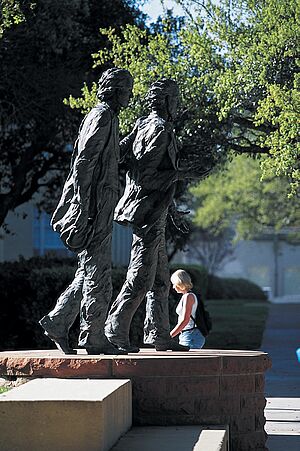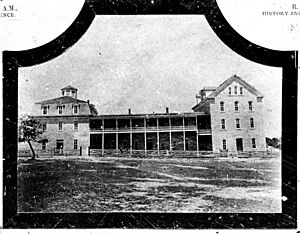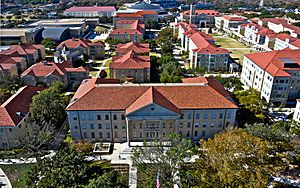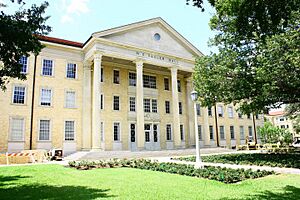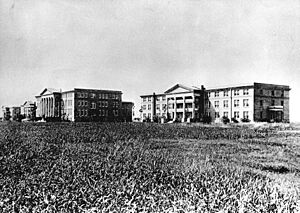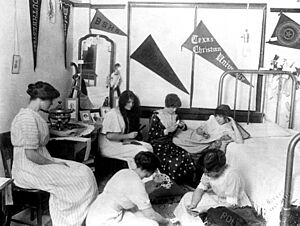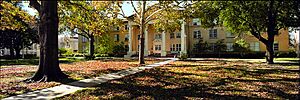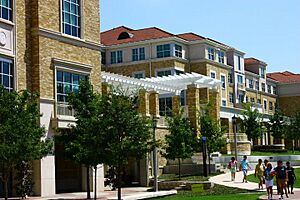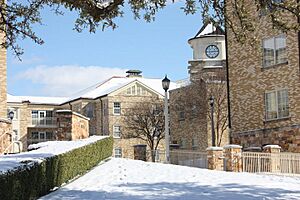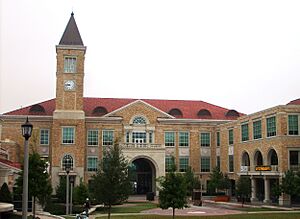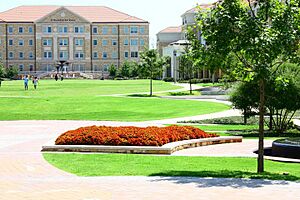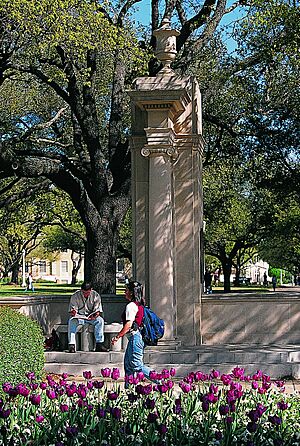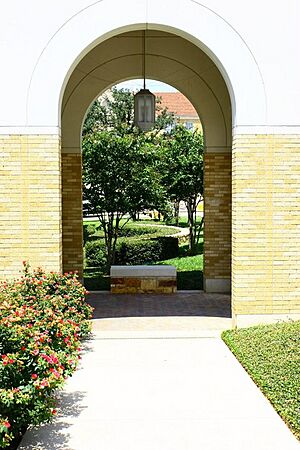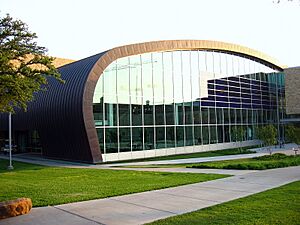Texas Christian University facts for kids
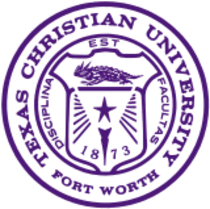 |
|
|
Former name
|
Add-Ran Male & Female College (1873–1889) Add-Ran Christian University (1889–1902) |
|---|---|
| Motto |
Disciplina est Facultas
|
|
Motto in English
|
"Knowledge is power" |
| Type | Private research university |
| Established | 1873 |
| Accreditation | SACS |
|
Religious affiliation
|
Christian Church (Disciples of Christ) |
|
Academic affiliations
|
|
| Endowment | $2.7 billion (2024) |
| Chancellor | Daniel W. Pullin |
| Provost | Floyd L. Wormley, Jr. (interim) |
|
Academic staff
|
981 (623 full-time) |
| Students | 12,938 (fall 2024) |
| Undergraduates | 11,049 (fall 2024) |
| Postgraduates | 1,889 (fall 2024) |
| Location |
,
,
United States
32°42′35″N 97°21′50″W / 32.7096°N 97.3640°W |
| Campus | Large city, 325 acres (132 ha) |
| Newspaper | TCU 360 |
| Colors | Purple and white |
| Nickname | Horned Frogs |
|
Sporting affiliations
|
|
| Mascot | Horned Frog |
Texas Christian University (TCU) is a private university in Fort Worth, Texas, USA. It was started in 1873 by two brothers, Addison and Randolph Clark. They named it the Add-Ran Male & Female College. TCU is connected to the Christian Church (Disciples of Christ).
The main campus is about 4 miles (6.5 km) from downtown Fort Worth. It covers about 302 acres. TCU has nine different colleges and schools. It is known for its high level of research. In 2022, the university received about $19 million for research.
TCU's mascot is Superfrog. This mascot is based on the horned frog, which is a Texas state reptile. TCU sports teams are called the Horned Frogs. They compete in the Big 12 conference of the NCAA's Division I. In fall 2024, about 12,938 students were enrolled at TCU. Most of them, 11,049, were undergraduate students.
Contents
University History
Starting in Fort Worth (1869–1873)
Brothers Addison and Randolph Clark, along with their father Joseph A. Clark, founded TCU. The Clark family were teachers and preachers. They were part of the Restoration Movement, which helped start the modern Christian Church (Disciples of Christ). They believed strongly in education.
After serving in the Civil War, Addison and Randolph wanted to open a school. They started the Male & Female Seminary of Fort Worth in 1869. The brothers dreamed of creating a college that followed Christian values. It would also be open to all ideas and not tied to one specific church. In 1869, they bought land in downtown Fort Worth for their college.
However, Fort Worth changed a lot between 1867 and 1874. The Chisholm Trail brought many cattle, people, and money to the town. The area around the land the Clarks bought became filled with saloons and gambling halls. By 1872, this area was known as "Hell's Half Acre". The Clarks decided to find a different place for their college. They chose Thorp Spring. This small town was about 40 miles (64 km) southwest in Hood County.
Moving to Thorp Spring (1873–1895)
In 1873, the Clark brothers moved to Thorp Spring. There, they founded Add-Ran Male & Female College. TCU considers 1873 as its founding year. The university still honors this original college through its AddRan College of Liberal Arts.
Add-Ran College was one of the first colleges west of the Mississippi River to allow both boys and girls to study together. The college grew quickly. It started with 13 students in the fall of 1873. Soon, it had between 200 and 400 students each year. Students came from over 100 counties in Texas. The Clark brothers also brought in excellent professors from across the South.
In 1889, Add-Ran College officially partnered with the Christian Church (Disciples of Christ). However, the church never managed the university. In 1889, the school was renamed Add-Ran Christian University.
Moving to Waco (1895–1910)
The university needed a bigger city and better transportation. So, it moved to Waco in 1895. It bought the campus of a college that had closed. In 1902, the institution was renamed Texas Christian University, or TCU. During its 15 years in Waco, TCU started playing intercollegiate football in 1896. It also chose its school colors, purple and white, and its Horned Frog mascot. A friendly competition, or rivalry, began between TCU and nearby Baylor University.
Returning to Fort Worth (1910–Present)
In 1910, a fire destroyed TCU's main administration building. The university planned to rebuild. But before they could start, business people from Fort Worth offered TCU $200,000 (which is about $6.6 million today) and a 50-acre campus. This offer convinced the university to move back to Fort Worth.
In 1910–1911, the TCU campus in Fort Worth had four buildings. These were Clark Hall and Goode Hall for men, Jarvis Hall for women, and the Main Administration building (now Reed Hall).
In 1923, TCU received its first large gift from Mary Couts Burnett. She was the widow of Samuel Burk Burnett, a rich rancher and oilman. Mary Couts Burnett gave her entire estate to TCU. This included a share in the large 6666 ("Four Sixes") Ranch. The Mary Couts Burnett Library is named after her.
University Campus
TCU's campus covers about 302 acres. It is located four miles (6.5 km) from downtown Fort Worth.
The campus has three main areas: where students live, where classes are held, and Worth Hills. University Drive, a street lined with oak trees, separates the living and academic areas. Residence halls, the Student Union, and the Campus Commons are west of University Drive. The library, chapel, and most academic buildings are to the east. All streets around TCU are lined with live oaks.
About half of TCU's undergraduate students live on campus. There are 16 residence halls and apartment complexes for students.
TCU's buildings have a classic, beautiful style. They often use a special golden brick called "TCU buff." Most buildings have red-tile roofs. The oldest buildings have columns.
Robert Carr Chapel is an exception. It was the first building not made with "TCU buff" bricks. It has a unique salmon-colored brick. This caused some alumni to protest when it opened in 1953.
TCU is home to the Starpoint School. This school helps students in grades 1–6 who learn differently. Starpoint aims to find new ways to help students with learning disabilities. KinderFrogs School is also on campus. It's a preschool for children with Down syndrome. TCU is the only university in the U.S. with two such special education schools on its campus.
Since 2006, many parts of the campus have been updated. The old Student Center was replaced by Scharbauer Hall in 2010. This building holds many AddRan College offices and classrooms. Erma Lowe Hall, home to the School for Classical & Contemporary Dance, was renovated in 2011. A new building for Brite Divinity School was finished in 2012.
The Van Cliburn Concert Hall at TCU opened in 2022. The TCU Music Center opened in 2020.
Academics and Learning
Becoming a TCU Student
| Admissions statistics | |
|---|---|
|
2023 entering
classChange vs. 2018 |
|
| Admit rate | 42.6%
(
|
| Yield rate | 24.1%
(
|
| Test scores middle 50% | |
| SAT Total | 1140–1345 |
| ACT Composite | 26–31 |
In 2022, U.S. News & World Report said TCU is "more selective." For the class that started in fall 2023, TCU received over 20,500 applications. It accepted about 8,740 students, which is 42.6%. Of those accepted, 2,488 chose to attend TCU. This means about 28.5% of accepted students enrolled. Most freshmen (94.3%) stay at TCU after their first year. About 85.6% graduate within six years.
Students who started in 2025 had good test scores. The middle 50% of SAT scores were between 1140 and 1345. The middle 50% of ACT scores were between 26 and 31.
TCU received a record number of applications in 2011, over 19,000. This was a big jump from 2010. Many applicants (60%) were from outside Texas. In 2000, only 4,500 students applied. By 2023, 52% of undergraduate students were from out-of-state. Most of these students came from California.
| 2021 | 2020 | 2019 | 2018 | 2017 | 2016 | |
|---|---|---|---|---|---|---|
| Applicants | 19,782 | 21,145 | 19,028 | 20,156 | 19,740 | 19,972 |
| Admits | 10,606 | 10,155 | 8,966 | 8,210 | 8,110 | 7,506 |
| Admit rate | 53.6 | 48.0 | 47.1 | 40.7 | 41.1 | 37.6 |
| Enrolled | 2,560 | 2,287 | 2,159 | 2,194 | 1,955 | 1,888 |
| Yield rate | 24.1 | 22.5 | 24.1 | 26.7 | 24.1 | 25.2 |
| ACT composite* (out of 36) |
26–31 | 25–31 | 25–31 | 26–30 | 25–30 | 25–30 |
| SAT composite* (out of 1600) |
1140–1345 | 1120–1310 | 1150–1340 | 1150–1343 | 1130–1330 | — |
| * middle 50% range |
University Rankings
| USNWR National University | 105 (tie) |
|---|---|
| Washington Monthly National University | 351 |
| Business | 43 (tie) |
| Education | 114 (tie) |
| Medicine: Primary Care | |
| Medicine: Research | Tier 4 |
| Chemistry | 161 (tie) |
| English | 131 (tie) |
| Fine Arts | 178 (tie) |
| History | 104 (tie) |
| Mathematics | 173 (tie) |
| Nursing: Anesthesia | 12 (tie) |
| Physics | 167 (tie) |
| Psychology | 214 (tie) |
| Social Work | 142 (tie) |
| Speech-Language Pathology | 74 (tie) |
TCU is known as a Doctoral University with High Research Activity. It is approved by the Southern Association of Colleges and Schools. As of 2025, U.S. News & World Report ranks TCU as No. 105 among National Universities.
What You Can Study
The university offers 117 different majors for undergraduate students. It also has 62 master's programs and 25 doctoral programs. Some of the most popular majors are Business, which about 25% of students choose. Journalism and Strategic Communications is also popular, chosen by about 20% of students. Nursing and Education are also common choices. Many students decide to major in more than one subject.
TCU has several colleges and schools:
- AddRan College of Liberal Arts
- Bob Schieffer College of Communication
- College of Education
- College of Fine Arts
- College of Science and Engineering
- Harris College of Nursing and Health Sciences
- M. J. Neeley School of Business
- Anne Burnett Marion School of Medicine
- School of Interdisciplinary Studies
- John V. Roach Honors College
TCU also hosts the Brite Divinity School. This school is related to the Disciples of Christ church. Its students can use all of TCU's facilities. Graduates from Brite receive their degrees directly from TCU.
In 2015, TCU and the University of North Texas Health Science Center started a medical school together. The first class of 60 students began in 2019. They plan to have 240 students when the school is fully open.
The Neeley School of Business was ranked as the No. 25 best undergraduate business school in 2023 by Poets and Quants.
TCU works with the U.S. military. It has ROTC programs for the Air Force and Army. Since 1951, almost 1000 TCU graduates have become Army officers through ROTC.
During World War II, TCU was one of 131 colleges that joined the V-12 Navy College Training Program. This program helped students become Navy officers.
The university also manages the 450-acre TCU Rhino Initiative. This is a preserve for southern white rhinoceros. Doctor Michael Slattery started it in 2014.
Student Life
Who Goes to TCU?
| Race and ethnicity | Total | ||
|---|---|---|---|
| White | 68% |
|
|
| Hispanic | 16% |
|
|
| Black | 5% |
|
|
| Foreign national | 4% |
|
|
| Other | 4% |
|
|
| Asian | 3% |
|
|
| Economic diversity | |||
| Low-income | 12% |
|
|
| Affluent | 88% |
|
|
In 2024–2025, TCU had 12,938 students. This included 11,049 undergraduate students and 1,889 graduate students. About 61% of students are women, and 39% are men. Undergraduate students come from all 50 states. About 48% are from Texas.
More women tend to study nursing, education, and advertising-public relations. Business and political science majors have a more even mix of men and women. Even in fields like engineering and science, TCU often has a higher percentage of female students than other similar universities.
Most students and teachers at TCU are non-Hispanic white. However, the number of minority students has grown in recent years, especially Hispanic students. TCU also tries to increase diversity by hosting special weekends for Black and Hispanic high school seniors. They also offer full scholarships to talented minority students from North Texas who come from less wealthy backgrounds.
Student Groups and Events
TCU has over 200 official student organizations. These include groups like Amnesty International and Habitat for Humanity. Students can also play intramural sports like basketball. There are also hobby groups, such as the TCU Quidditch League.
Many students join campus ministries. These include Disciples on Campus, a Christian student group. Other groups are Ignite, a non-denominational ministry, and Catholic Community. There's also TCU Wesley (Methodist) and the Latter-Day Saint Student Association (LDSSA). Cru is another non-denominational group. Most religious groups are Christian. However, TCU also supports Hillel for Jewish students. The Muslim Students Association (MSA) is also active. Each year, students can apply to live in the Interfaith Living Learning Community. Here, students of different religious beliefs live together.
At the start of each fall semester, TCU's student government holds a big concert. These concerts are free for all students. Past performers have included Pat Green, OneRepublic, Lady Antebellum, The Fray, Blake Shelton, Little Big Town, and Jason Derulo.
Student News and Media
The Bob Schieffer College of Communication runs several student publications:
- The Skiff: A weekly newspaper. It started in 1902 and is one of the oldest newspapers in Tarrant County.
- TCU360.com: The student-run news website.
- Image Magazine: TCU's student magazine, published once a semester. It focuses on in-depth campus issues.
- KTCU-FM 88.7, "The Choice": TCU's own radio station. It plays music and talk shows. It also broadcasts live Horned Frog football, basketball, and baseball games.
Other student-run media include:
- eleven40seven
- The Horned Frog: The school yearbook since 1897.
Greek Life
About 50% of undergraduate students are part of TCU's Greek system. There are many fraternities and sororities on campus.
Being Green at TCU
TCU has a "Purple Bike" program. Students can use purple bicycles for free instead of cars. Scharbauer Hall, which opened in 2010, is a "Gold" certified building. This means it meets high standards for being environmentally friendly.
In 2010, TCU staff held a conference about sustainability. They discussed how to help the environment and social justice. The Department of Sociology and Anthropology also focuses on these topics in its classes.
Sports and Athletics
TCU competes in NCAA Division I sports. It is a member of the Big 12 Conference (Big XII). For most of its history (1923–1996), TCU was part of the Southwest Conference (SWC), which no longer exists. Before joining the Big XII in 2012, TCU was in the Mountain West Conference (MWC) for seven years (2005–2011).
TCU has eight men's sports teams and twelve women's sports teams. Men's sports include baseball, basketball, football, golf, swimming & diving, track & field, cross country, and tennis. Women's sports include basketball, volleyball, beach volleyball, golf, swimming & diving, cross country, track & field, triathlon, soccer, rifle, equestrian, and tennis.
In recent years, TCU has improved its sports facilities. The Abe-Martin Academic Enhancement Center was finished in 2008. The Amon G. Carter Football Stadium was rebuilt in 2012. An expansion on the east side was completed in 2019. The Daniel-Meyer Coliseum was rebuilt and became Ed and Rae Schollmaier Arena for the 2015–16 basketball season. It has more seats, better food stands, and luxury areas for fans.
Football Success
The Horned Frogs football team has won two national championships, in 1935 and 1938. They also played in the 2023 College Football Playoff National Championship game. The team has won eighteen conference championships. Many famous football players have played for TCU. These include Sammy Baugh, Davey O'Brien, Jim Swink, Bob Lilly, LaDainian Tomlinson, and Andy Dalton.
Sports Rivalries
TCU has an old and famous rivalry with Baylor University. It's called The Revivalry. This is a major rivalry between two church-affiliated schools. It is one of the oldest rivalries in the country. TCU currently leads the series 59-54-7 since 1899.
The TCU Horned Frogs also have a historic rivalry with the Southern Methodist University Mustangs. SMU is in Dallas, Fort Worth's sister city. In football, TCU and SMU teams play every year for the Battle for the Iron Skillet. This tradition started in 1946. Before a game, an SMU fan was jokingly frying "Frog Legs." A TCU fan saw this as disrespectful. He said they should let the game decide who gets the skillet and the frog legs. SMU won that game, and the skillet and frog legs went to SMU. Now, the Iron Skillet is given to the winner of the game as a trophy.
West Virginia University has become a rival. This is because both schools joined the Big 12 Conference in 2012. Their football games have often been very close and exciting. The rivalry with Boise State University is also important. TCU and Boise State were both known as "BCS Busters" in the 2000s. They played each other in the Mountain West Conference for one year. TCU won that game in 2011. This rivalry will be played less often now. TCU is in the "Power Conference" Big 12, and Boise State is a leader in the "Group of Five" Conferences.
Notable People
Famous Teachers
- Stanley Block: Professor of Finance
- Teresa Abi-Nader Dahlberg: Engineering professor
- Lydia Mackay: Professor of theatre and actress
- David Moessner: Professor of religion
- Gene A. Smith: Historian
- Steven E. Woodworth: Civil War historian
- Susan E. Ramírez: Professor of history and Latin American studies
Famous Alumni
TCU has over 100,000 living alumni, which are former students.
See also
 In Spanish: Universidad Cristiana de Texas para niños
In Spanish: Universidad Cristiana de Texas para niños
 | Calvin Brent |
 | Walter T. Bailey |
 | Martha Cassell Thompson |
 | Alberta Jeannette Cassell |


